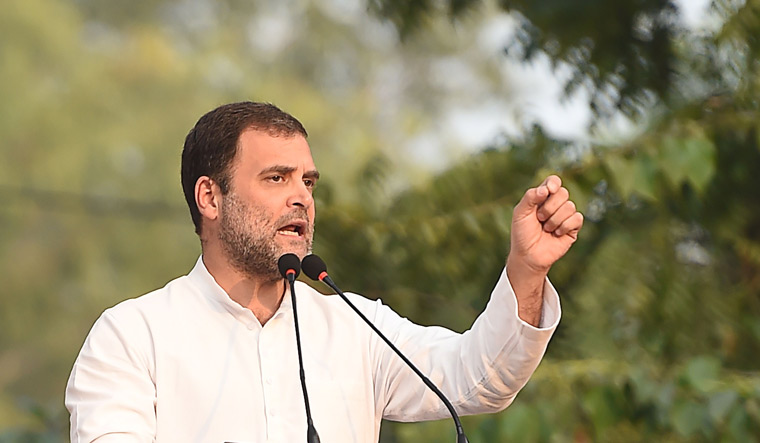Speaking to Congress leader Rahul Gandhi, global public health professional Ashish Jha said that pushing for herd immunity in India will be a disaster and that the virus is here to stay for 12-18 months. "The virus will grow exponentially. On an average, one patient infects three people. We need to separate the infected from uninfected. Can you slow the virus by a lockdown? You can, but it has severe economic repercussions," said Jha.
On a question of how the virus could change society, Gandhi said that he did not think there will be just a single response to the disease. "Some states are doing much better. More decentralised states will do better, that is my sense. Large urban centres will get hurt badly. I hope people will come together and realise that you can't fight this disease as different religions, castes, genders."
Jha said it was also very important how we utilise the lockdown time, responding to Gandhi's questions about the need for a psychological shift. "You want to use it to develop fabulous test and trace methods. There is also a psychological aspect. There is a very clear signal you send to people with a lockdown. We are telling people that it is deadly. When we open up, we have to create confidence or people won't engage in economic activities."
Rahul asked Jha about the psychological and economic nature of the lockdown. "Migrant labourers I spoke told me that uncertainty is the most frightening thing," said Gandhi. "How do we open up?"
"This is a 12-18 months problem," Jha said. "If everything goes really well, if vaccine is available by then, we can expect a change by 2021. It is extremely important to have a strategy for opening up. No one can guarantee there won't be major outbreaks. But we can minimise chances."
"How do we think about testing as strategy?" asked Rahul. Responded Jha: "South Korea, Taiwan and Hong Kong have done really well in testing. In generic terms, test everybody with symptoms. Of course a lot of them are asymptomatic. You should have strategy for surveillance of high risk areas. We talk a lot here about homes for elderly people or hospitals. We need aggressive testing strategies in such high-risk areas. We also need more community level surveillance."
India has a unique characteristic in that there are a lot of young people with diabetes, heart disease, hypertension. How do we deal with these issues, asked Gandhi. "We are finding that even healthy young people are getting very ill. We can't be cavalier about this. We have to protect these people. Herd immunity in India is a terrible idea as millions will die, even young people," said Jha
"So do you believe in such reports that virus doesn't survive in hot temperature. I am sceptical," asked Gandhi. "There is circumstantial evidence that BCG vaccination could be one factor, but I wouldn't bank on it, certainly not enough to make policies on that. Tests are happening and we will know soon. Regarding hot weather, there is some evidence. Do we believe it is enough to keep the virus under control. Nobody I know thinks that. Maybe the transmission rate of 3 people on average will be down to 2.5 people. A 20 per cent reduction."
India has many advantages and it has a very vibrant biotechnology industry, said Jha, indicating that India can and should be doing more testing than what they are doing now.
Gandhi was speaking to Jha and Swedish epidemiologist Johan Giesecke as part of his ongoing series of dialogues with globally recognised experts in economics, social sciences, healthcare on tackling the COVID-19 crisis. These conversations form the basis of the third episode of his 'The COVID crisis' series.
Previous episodes have featured conversations with world renowned economist Raghuram Rajan and Nobel Prize winner Abhijit Banerjee.
Talking to Banerjee, Rahul Gandhi had stressed on the need for safety nets for the poor like the NREGA, Right to Food, and his pre-poll proposal for a direct cash transfer for the poor aka NYAY. Rahul highlighted the need to prop us MSMEs which employ the poorest sections of the society and stressed on the need for decentralisation. “Decentralising as much as possible, which they can handle at the local level, is in my view a good thing. So the tendency should be to sort of parcel out things that can be managed at the district level and the state level. Of course, there are some things. The district collector cannot decide about airlines or railways and stuff. So I feel that the big decisions should be national. But, even in the lockdown front, leeway should be given to the states. If you want to lock down, you want to understand the nature of your lockdown, you please do your lockdown,” he said.
Before that, Rahul had held a conversation with former Reserve Bank Governor Raghuram Rajan. While Rajan called for a fiscal spending of Rs 65,000 crore to help the poor tide over the COVID-19 lockdown, and highlighted the need for at least 2 million tests, Rahul had said that India could not be compared to other countries in the world. The scale of the problem was different to begin with, and inequality in the Indian society made the situation completely different, he said. “The inequality and the nature of the inequality... Things like caste. The way Indian society is structured, it is different from American society. A lot of these problems are different in different states... One blanket solution for the whole of India cannot work,” he said.


